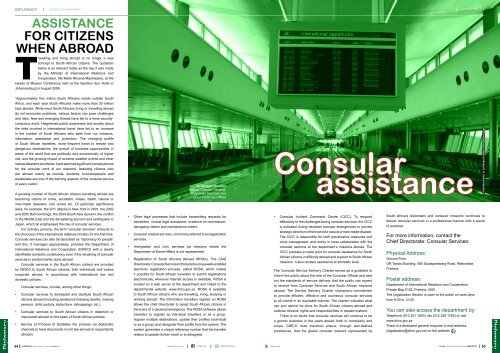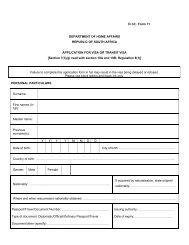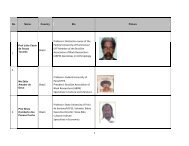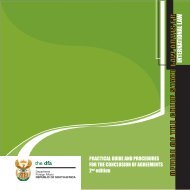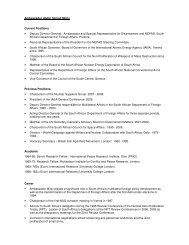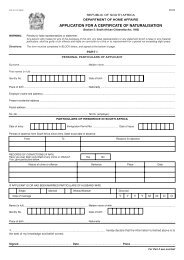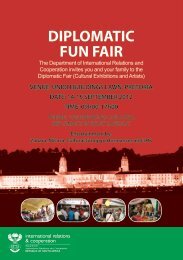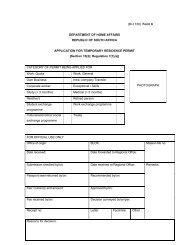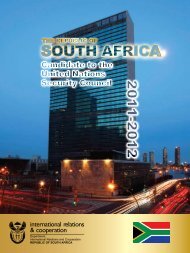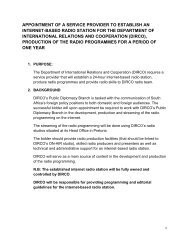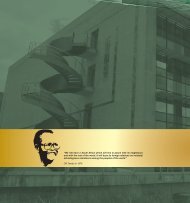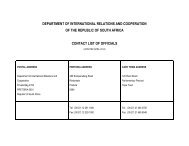UBUNTU Magazine Issue 1 - Department of International Relations ...
UBUNTU Magazine Issue 1 - Department of International Relations ...
UBUNTU Magazine Issue 1 - Department of International Relations ...
Create successful ePaper yourself
Turn your PDF publications into a flip-book with our unique Google optimized e-Paper software.
DIPLOMACY<br />
COUNCILOR ASSISTANCE<br />
ASSISTANCE<br />
FOR CITIZENS<br />
WHEN ABROAD<br />
Travelling and living abroad is no longer a new<br />
concept to South African citizens. The quotation<br />
below is as relevant today as the day it was made<br />
by the Minister <strong>of</strong> <strong>International</strong> <strong>Relations</strong> and<br />
Cooperation, Ms Maite Nkoana-Mashabane, at the<br />
Heads <strong>of</strong> Mission Conference held at the Sandton Sun Hotel in<br />
Johannesburg in August 2009.<br />
CONSULAR ASSISTANCE<br />
DIPLOMACY<br />
Diplomacy<br />
“Approximately five million South Africans reside outside South<br />
Africa, and each year South Africans make more than 30 million<br />
trips abroad. While most South Africans living or travelling abroad<br />
do not encounter problems, various factors can pose challenges<br />
and risks. New and emerging threats have led to a more securityconscious<br />
world. Heightened public awareness and anxiety about<br />
the risks involved in international travel have led to an increase<br />
in the number <strong>of</strong> South Africans who seek from our missions,<br />
information, assistance and protection. The changing pr<strong>of</strong>ile<br />
<strong>of</strong> South African travellers, more frequent travel to remote and<br />
dangerous destinations, the pursuit <strong>of</strong> business opportunities in<br />
areas <strong>of</strong> the world that are politically and economically <strong>of</strong> higher<br />
risk, and the growing impact <strong>of</strong> extreme weather events and other<br />
natural disasters worldwide, have also had significant consequences<br />
for the consular work <strong>of</strong> our missions. Assisting citizens who<br />
are abroad mainly as tourists, students, businesspeople and<br />
expatriates are one <strong>of</strong> the defining aspects <strong>of</strong> the consular service<br />
<strong>of</strong> every nation”.<br />
A growing number <strong>of</strong> South African citizens travelling abroad are<br />
becoming victims <strong>of</strong> crime, accidents, illness, death, natural or<br />
man-made disasters, civil unrest etc. Of particular significance<br />
were, for example, the 9/11 attacks in New York in 2001, the 2002<br />
and 2005 Bali bombings, the 2004 South Asia tsunami, the conflict<br />
in the Middle East and the devastating tsunami and earthquake in<br />
Japan, which all emphasised the role <strong>of</strong> consular services.<br />
For ordinary persons, the term “consular services” amounts to<br />
the discovery <strong>of</strong> the international relations ministry for the first time.<br />
Consular services can also be described as “diplomacy for people”<br />
and this, if managed appropriately, provides the <strong>Department</strong> <strong>of</strong><br />
<strong>International</strong> <strong>Relations</strong> and Cooperation (DIRCO) with a clearly<br />
identifiable domestic constituency even if the rendering <strong>of</strong> consular<br />
services is predominantly done abroad.<br />
Consular services in the South African context are provided<br />
by DIRCO to South African citizens, both individuals and bodies<br />
corporate abroad, in accordance with international law and<br />
domestic policies.<br />
Consular services, include, among other things:<br />
• Consular services to distressed and destitute South African<br />
citizens abroad (including assistance following deaths, missing<br />
persons, child custody, abductions, kidnappings, etc.).<br />
• Consular services to South African citizens in detention or<br />
imprisoned abroad on the basis <strong>of</strong> South African policies.<br />
• Service <strong>of</strong> Process (it facilitates the process via diplomatic<br />
channels to have documents in civil law served on respondents<br />
abroad).<br />
By Asogan Moodley<br />
Deputy Director-General:<br />
Corporate Services and<br />
Chief Financial Officer<br />
• Other legal processes that include transmitting requests for<br />
extradition, mutual legal assistance, evidence on commission,<br />
derogatory letters and maintenance orders.<br />
• Consular notarial services, commonly referred to as legalisation<br />
services.<br />
• Immigration and civic services (at missions where the<br />
<strong>Department</strong> <strong>of</strong> Home Affairs is not represented).<br />
• Registration <strong>of</strong> South Africans Abroad (ROSA). The Chief<br />
Directorate: Consular Services introduced a unique web-enabled<br />
electronic registration process, called ROSA, which makes<br />
it possible for South African travellers to submit registrations<br />
electronically, wherever Internet access is available. ROSA is<br />
located on a web server at the department and linked to the<br />
departmental website, www.dirco.gov.za. ROSA is available<br />
to South African citizens who are travelling, living, studying or<br />
working abroad. The information travellers register on ROSA<br />
allows the chief directorate to assist South African citizens in<br />
the event <strong>of</strong> a declared emergency. The ROSA s<strong>of</strong>tware allows<br />
travellers to register as individual travellers or as a group,<br />
register multiple destinations, update their pr<strong>of</strong>iles (individual<br />
or as a group) and deregister their pr<strong>of</strong>ile from the system. The<br />
system generates a unique reference number that the traveller<br />
retains to update his/her travel or to deregister.<br />
Consular<br />
assistance<br />
• Consular Incident Command Centre (CICC). To respond<br />
effectively to the challenges facing consular services, the CICC<br />
is activated during declared consular emergencies to provide<br />
strategic direction in the event <strong>of</strong> a natural or man-made disaster.<br />
The CICC is responsible for both preventative measures and<br />
crisis management, and works in close collaboration with the<br />
consular sections at the department’s missions abroad. The<br />
CICC provides a nodal point for consular assistance for South<br />
African citizens in difficulty abroad and support to South African<br />
missions. It also renders assistance at domestic level.<br />
The Consular Service Delivery Charter serves as a guideline to<br />
inform the public about the role <strong>of</strong> the Consular Official and sets<br />
out the standards <strong>of</strong> service delivery that the public can expect<br />
to receive from Consular Services and South African missions<br />
abroad. The Service Delivery Charter champions commitment<br />
to provide efficient, effective and courteous consular services<br />
to all clients in an equitable manner. The charter indicates what<br />
can and cannot be done for South African citizens abroad and<br />
outlines citizens’ rights and responsibilities in related matters.<br />
There is no doubt that consular services will continue to be<br />
a growth business in the years ahead, both in complexity and<br />
scope. DIRCO must therefore ensure, through well-defined<br />
procedures, that the global consular network represented by<br />
South Africa’s diplomatic and consular missions continues to<br />
deliver consular services in a pr<strong>of</strong>essional manner with a sense<br />
<strong>of</strong> purpose.<br />
For more information, contact the<br />
Chief Directorate: Consular Services:<br />
Physical Address:<br />
Ground Floor,<br />
OR Tambo Building, 460 Soutspansberg Road, Rietondale,<br />
Pretoria.<br />
Postal address:<br />
<strong>Department</strong> <strong>of</strong> <strong>International</strong> <strong>Relations</strong> and Cooperation,<br />
Private Bag X152, Pretoria, 0001.<br />
The Legalisation Section is open to the public on work days<br />
from 8:30 to 12:30.<br />
You can also access the department by:<br />
Telephone (012 351 1000), fax (012 329 1752) or visit<br />
www.dirco.gov.za.<br />
There is a dedicated general enquires’ e-mail address<br />
(legalisation@dirco.gov.za) on the website.<br />
54 <strong>UBUNTU</strong> diplomacy in action <strong>Issue</strong> 1 www.dirco.gov.za DIRCOza<br />
@theDIRCOza thedircoza<br />
<strong>Issue</strong> 1 diplomacy in action <strong>UBUNTU</strong> 55<br />
OR Tambo <strong>International</strong> Airport in Johannesburg<br />
Diplomacy


